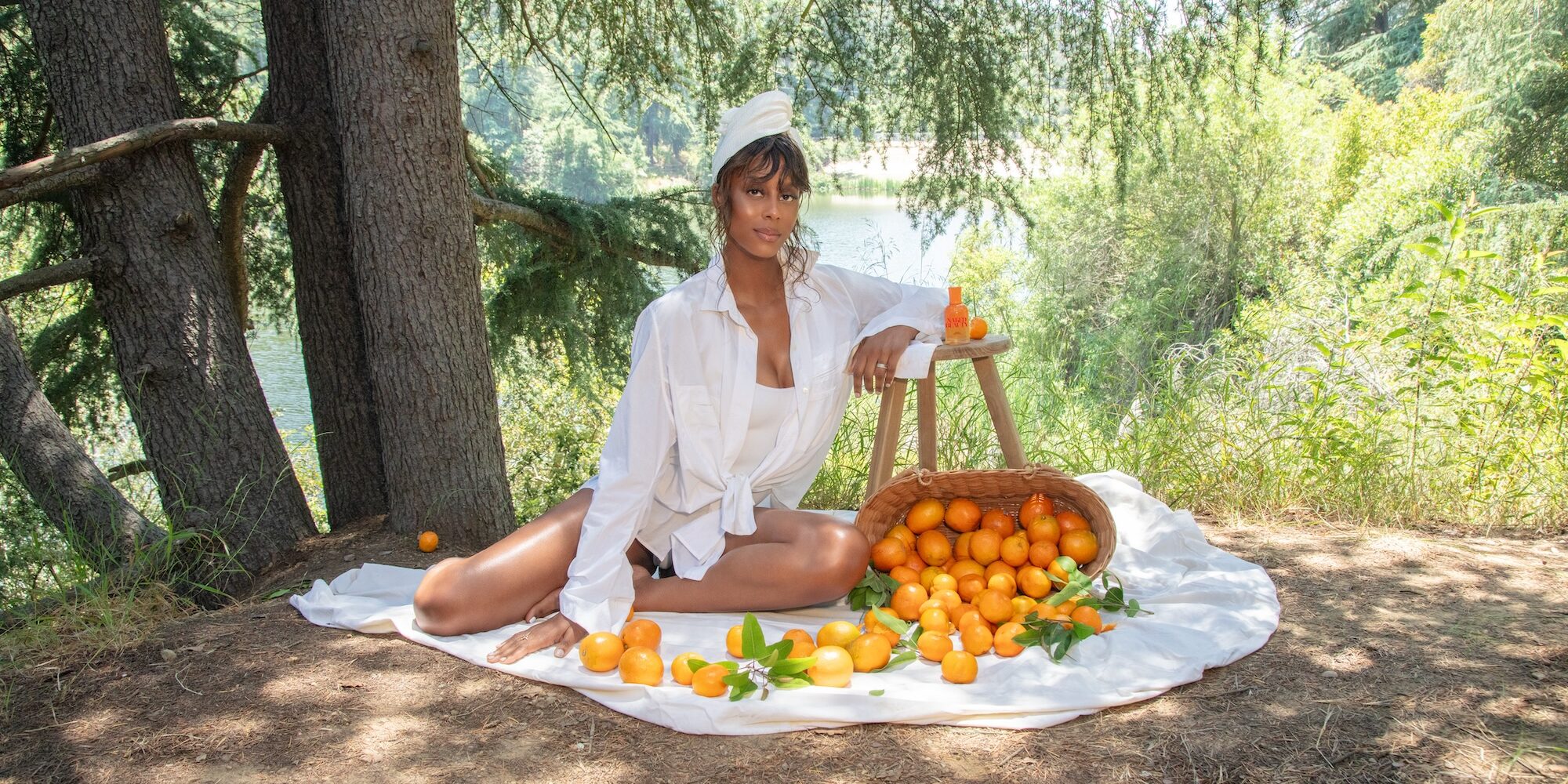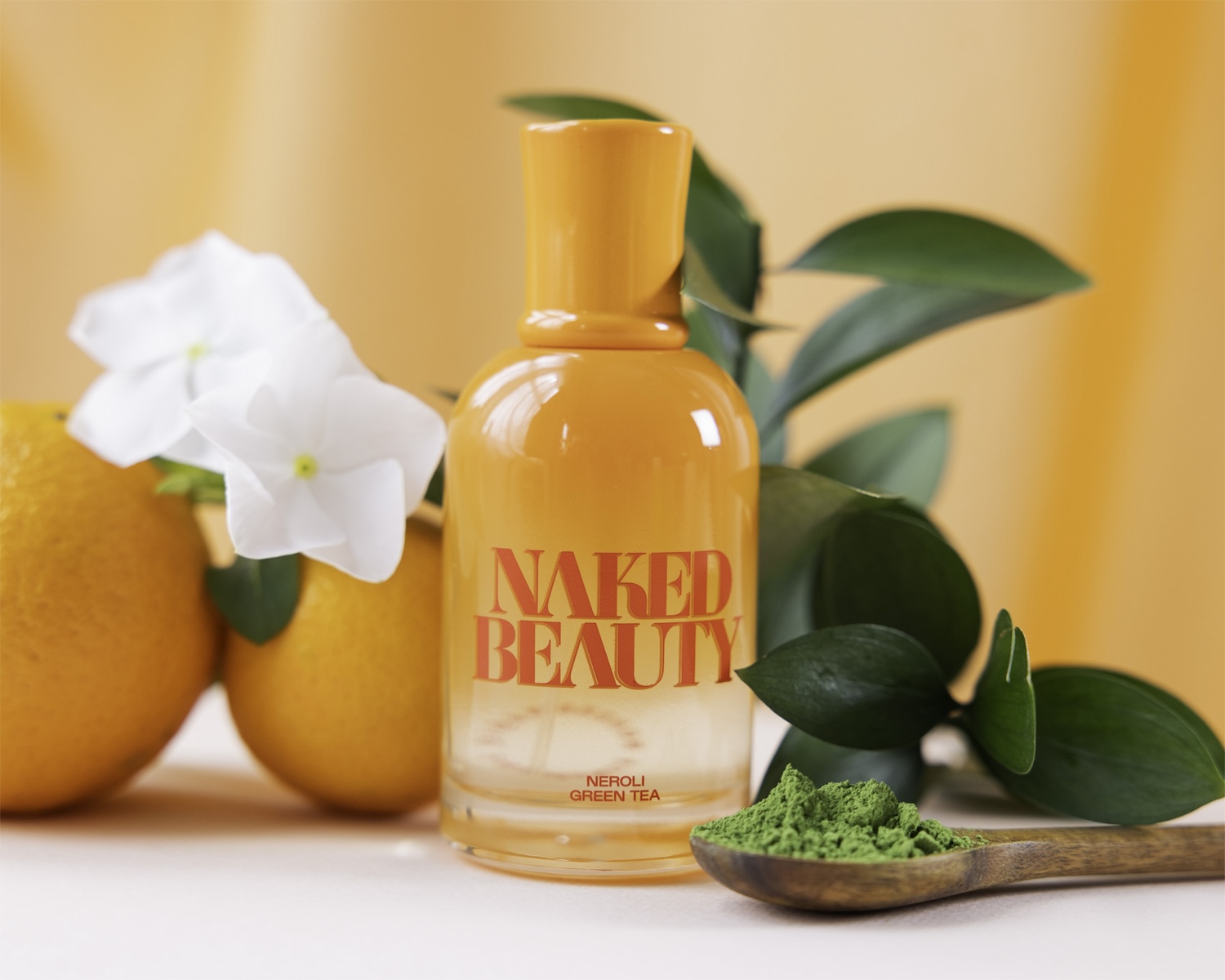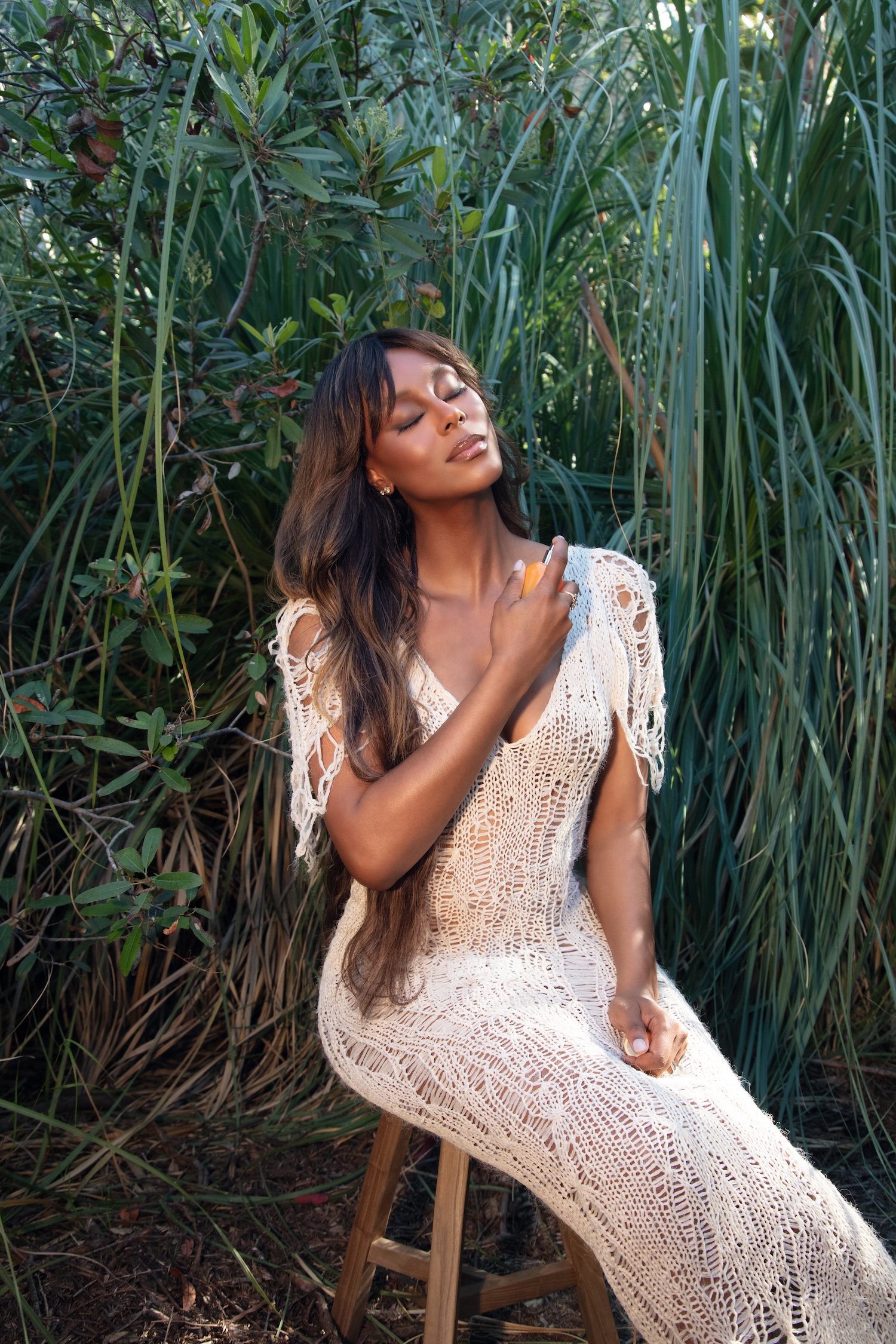
“Naked Beauty” Podcast Host Brooke DeVard On Developing A Fragrance With Modern Magic
Brooke DeVard, host of “Naked Beauty,” the podcast ranked by Chartable as the top fashion and beauty Apple podcast in the United States, has flirted with the idea of releasing her own fragrance for years. The time has finally come.
Created in collaboration with Modern Magic, a fragrance brand from the incubator Slate Brands, the scent aptly named Naked Beauty is inspired by DeVard’s experience in Los Angeles, which she moved to from New York in 2022 with her husband and son. Its orange blossom note hints at an orange tree she has in her backyard, and sandalwood and cedar wood notes harken to hikes she takes almost daily.
Naked Beauty also has notes of neroli, green tea, bergamot and Iso E Super, an ingredient from fragrance supplier IFF that imbues scent with sweet woodiness. Priced at $88, it’s available at Thirteen Lune and on Modern Magic’s website.
DeVard says, “I wanted something that was reflective of a slower pace of life, a softer life, a more relaxed life, but something that still felt really warm and beautiful.”
Developing Naked Beauty, which took 17 iterations to finalize, impressed upon DeVard how few Black women work in fragrance, especially as compared to haircare and skincare. She envisions expanding into home fragrance next and is thinking about how to turn Naked Beauty into candles and body care.
“I’m surprised to see that not all categories have necessarily advanced at the same rate,” says DeVard. “I am really happy to be in the fragrance space, but I hope that it’s a space that we see more black women entering into.”
Ahead, Beauty Independent talks to DeVard about making a fragrance, the evolution of her podcast, and brands and products she’s loving.
Where does your love of beauty come from?
My interest in beauty actually started with my hair. This was 15 years ago, and it was the beginning of the natural hair movement becoming popular online, where people were doing the big chop and figuring out how to take care of their hair at home.
I was in college at the time, mixing different deep conditioners. I was buying henna powder and making my own henna hair masks. I was buying apple cider vinegar and using it to clarify my hair and getting smart about reading labels. I used to blindly buy products before, but the natural hair movement made me attune to what I was putting in my hair. It taught me about oils, shea butters, argan oils, jojoba oils, what a carrier oil is.
That naturally extended to my skincare. I started thinking, OK, maybe I can make my own facial serum, facial oil or cleansing balm. This was around the time of clean beauty becoming really popular. Vintner’s Daughter released their serum that everyone was obsessed with, and I was like, this serum sounds gorgeous, but it’s so expensive, can I make it?
I’ve since interviewed April Gargiulo, founder of Vintner’s Daughter, and I’ve told her about my early attempts at remaking her serum, which she finds very funny because there are 23 botanical ingredients in it. It’s not easy to remake at home.
I also started making my own fragrances. I would buy these little glass rollerballs and add essential oils— sandalwood, rose oil, lavender—and try to create these different moods with basic aromatherapy. I would use this as my everyday fragrance. I got really into buying single ingredients and mixing to create whatever I felt I needed at the time.
Were you into beauty as a child?
I was a huge beauty fan as a kid. My mom was an SVP at Revlon, and she would bring home eyeshadow quads and nail polishes she was testing. I, of course, loved testing everything and giving her feedback.
Since my mom worked in the beauty industry as a senior marketing executive, I always understood that beauty is an industry, and it was a big part of how women could choose to make themselves feel great. My mom and grandmother are both very glamorous and I saw them getting ready, taking the time to really pour into themselves, so that absolutely influenced me.
Growing up in Manhattan, I was a Ford model while I was in middle school and high school, so I would go on castings after school. I was going to New York Fashion Week when I was 15 years old. I was very exposed and aware of the fashion and beauty industries. I loved seeing Irving Penn’s editorials in Vogue. I followed beauty editors like Sarah Brown at Vogue very closely.

What was your first job out of college with an English major?
I graduated in 2011. Going to Stanford exposed me to the idea that young people could work in tech and social media. It was so new at the time. The founders of Instagram were seniors when I was a freshman. All through college I interned at fashion magazines. I was a Vogue intern and wanted to be a Vogue editor when I graduated, but then I learned the realities of how little you’re able to do when you’re starting out in your career. You’re pretty much just dropping off samples and steaming clothes.
I moved to London when I graduated and started working at Nokia in music product marketing. They were dabbling in content marketing. I produced a series of short films about music culture across America. I worked there for two and a half years. I absolutely loved it. I found it so rewarding and all of the jobs that I had after that, even when I did go back to fashion, were still on the tech side.
After Nokia, I did social media for Ralph Lauren and ran the Instagram account for all of the luxury brands. After I left, I went to Viacom CBS and did digital marketing. Then, I went to work at Instagram, which was where I was for the past five years before I decided to go out on my own to build the Naked Beauty podcast, which I launched in 2016.
There weren’t a whole lot of podcasts at the time, there certainly weren’t a lot of beauty podcasts, but I was hungry for deeper conversations about beauty that I wasn’t finding. I was listening to the Marc Maron podcast, I was listening to Joe Rogan, and I was reading Into The Gloss a lot, and I was like, I want to have a podcast where I can hear from women about their approach to beauty. I need to create the podcast I’m looking for.
Who was your first guest?
Caroline Solomon. She was a beauty editor at Glamour magazine at the time, but she was also my best friend from high school. It was very casual. We just sat legs crossed on my bedroom floor with a mic I ordered on Amazon, and I talked to her about her approach to beauty, what it’s like being a beauty editor, what products she was excited about.
At the end of the interview, I asked her, when do you feel most beautiful? I’ve now done over 350 episodes, and I’ve asked every single guest. That’s my signature question, and that DNA of the show has remained.
Has how your podcasting approach changed?
I’ve widened the aperture of the guests on the show. Now I talk to men on the podcast. I’ve had guests like Pharrell come on. I’m excited more men are part of the beauty conversation.
I’ve become a lot more careful with language. When people say things like “clean beauty,” pinpointing what does that mean? What does “clean” mean for you? When someone says, “This is a non-toxic formula,” OK, what does that actually mean?
The beauty movement of 2016 through 2018, there was a lot of fearmongering. People were freaked out about what they could and couldn’t use and what was bad for them. I try be specific with people about the language that they use so people don’t get freaked out.
People newer to skincare, there’s a lot of trepidation about, can I use this? Is this bad for me? Is this toxic? Is this going to cause long-term damage? The skincare industry unfortunately makes things confusing, and it doesn’t have to be.
I love when I have dermatologists on the podcast because they’re like, “You need a cleanser, moisturizer at nighttime and a sunscreen, that is it.” Everything else is great to have, but you don’t need a 12-step routine. I’ve focused more on how to simplify, how to make people feel comfortable.
Makeup artist Sir John is a co-host for the next couple of episodes. What made you bring him into the fold?
We have such great chemistry together. A lot of people, when they want to start a podcast, they’re like, oh, I need someone to do it with. but I have a singular point of view about the show. I know how I want to do it and didn’t necessarily see anyone as additive until I met Sir John.
Sir John has this saying, “Beauty as a feeling.” He always understood that beauty was so much deeper than the products we put on our face. The products we use are about how you feel, how you show up. It’s that inner work that’s so important. The more we talked, the more we were like, there’s really something here. Let’s do some episodes together.
We’ve been able to talk to amazing people like Ms. Tina Knowles. That was incredible for me because she really is the blueprint, the way she created Destiny’s Child, the way she raised her children, the way she’s steered so much of pop culture, even without us really knowing. Of course, her work with Cecred was amazing to hear about.
We recently interviewed Jackie Aina, who is an OG beauty YouTuber. Being able to go deep with her about her approach to creating her community was everything.
You’ve spoken on the podcast about wanting to do a fragrance. What was the process of bringing the fragrance to life like?
I’ve learned so much about what goes into creating a beautiful fragrance over these past two years of working with perfumers and noses. It is truly an art and a science, and I’m so grateful to have the partnership of Modern Magic to make it come to life. Before I even started thinking about what notes I wanted to have, I thought about the feeling I wanted the fragrance to have, and I really wanted something that was reflective of this new life chapter I’ve experienced.
Fragrance has traditionally been seen as something that celebrities do. Musicians or actors create a fragrance, but I think Judah [Abraham], founder of Slate Brands, understood there was an opportunity to partner with creators that had built-in community to make fragrance.
Their head of partnerships reached out to me and said, “I see the essential oils that you mix. We’re doing this new project where we would partner with you to make your dream fragrance.” Of course, I had a million questions about how it would work and what the parameters were. They were like, we will not stop the development process until you are extremely happy with the fragrance.

How different was the fragrance creation process with Slate Brands from mixing essential oils?
It was so different. You learn a lot about how delicate the balance was, and then you have to make something that’s consistent across thousands of bottles of fragrance. I also learned about things like maceration. For example, once you do make a fragrance, it has to sit for three weeks to a month for all the oils to come together so that it smells the way you want it to smell.
The tinkering was still similar to the experience of doing it on my own. Also, I’m pregnant now, so I feel like my nose is incredible. I can pick up fragrance notes so accurately it’s kind of scary, but I love that I’ve been able to educate my nose on different notes.
What brands or products are you loving right now?
There is this new facial oil, it was just sent to me. The brand is called said Sēd. It’s a hibiscus oil, and I’ve never tried hibiscus oil on my skin before, and it is just incredible. Sometimes I feel like I’ve tried all of the oils that are out there, there’s nothing new, and then something new comes along and I’m blown away by it.
One of the beautiful fragrance brands I’ve learned about in doing my research is Maya Njie. She’s based in London and makes beautiful fragrances based on her upbringing of being West African and Swedish. My favorite fragrance from her is called Nordic Cedar. It’s a little spicy, but it’s also fresh and green.
I love the Cecred haircare products. I know that everyone probably thinks I’m blinded by my love of Beyonée, but I truly think that they are some of the most gorgeous hair products I have ever used, specifically the deep conditioning mask. I think it’s the best deep conditioning mask I have ever used on my hair.
How has your beauty routine changed since moving to the West Coast?
The biggest thing is the amount of SPF I go through on a daily basis. I’m looking at my desk now, and I have three sunscreens in front of me: Paula’s Choice Youth-Extending Fluid, Dr. Loretta Sunscreen and Then I Met You’s Essence Light Sunscreen. I need to have sunscreen with me at all times because the sun in Los Angeles is relentless.
Are you still into DIY products?
Less so than I used to be, but yes. One of the things I still DIY is hand soap because you can buy basic plain Castile soap or any plain fragrance-free hand soap and add either almond oil or jojoba oil so it’s a bit more moisturizing. I hate drying hand soap. Then, I add a few drops of my favorite essential oil, whether that’s lavender or vanilla essential oil.
What are some of your future goals?
In the products category, I have these heatless hair rollers that I’m very excited about. We launched them in the spring, and I’ll be restocking those. It’s a really easy way to curl your hair overnight. I was so sick of flexi rods and waking up with a stiff neck. No one should have to suffer like that for beauty. So, I created these kind of retro heatless hair rollers that I absolutely love.
I am giving birth at the end of November, so I’m taking a little hiatus from the podcast. When it comes back in 2025, I’m thinking about new ways of storytelling, how we can integrate video more into the storytelling, how we can tell beauty stories that haven’t been told before. That’s what I’m really focused on for 2025, beauty storytelling on a whole other level.





Leave a Reply
You must be logged in to post a comment.